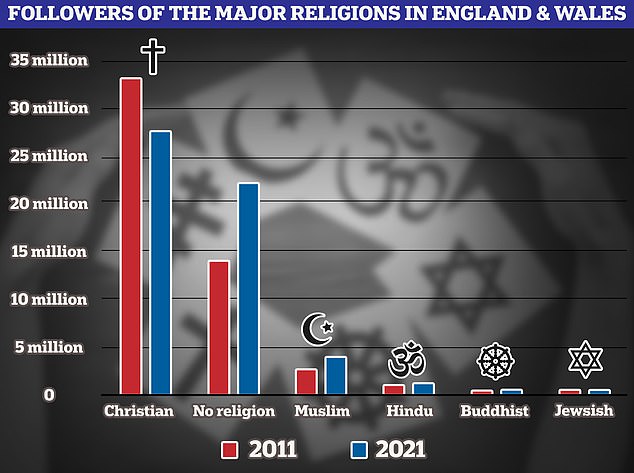Britain is entering its first ‘atheist age’: there are now more non-believers than those who believe in God – as parents fail to pass on their religious beliefs to their children, research shows
Britain is entering its first ‘atheist era’ as parents fail to pass on their religious beliefs to their children, a study has found.
For the first time in history, Britain now has more atheists than people who believe in the existence of a god, researchers have discovered.
The team also found that the stereotype of the ‘purposeless unbeliever’ – that atheists live lives devoid of meaning, morality and purpose – is simply not true.
Instead, many atheists and agnostics subscribe to objective moral values, human dignity and rights, and view family and freedom as important for finding meaning in the world, the survey found.
The three-year project involved several universities in the United Kingdom.
Graph showing the number of people in the English and Welsh regions who abandoned Christianity between 2011 and 2021, the number of people who follow no religion

Britain is entering its first ‘atheist age’ as parents fail to pass on their religious beliefs to their children, a study says (stock image)
It involved surveys of almost 25,000 people from six countries – Brazil, China, Denmark, Japan, Britain and the US – to find out why people become atheist and agnostic.
The team also brought together converging results from the British Social Attitudes Survey and World Values Survey to show that Britain now has a relative majority of atheists.
Figures from 2008 showed that 41.8 percent of Britons believed in God, while 35.2 percent did not.
Within ten years, in 2018, this was reversed: 35.2 percent believed and 42.9 percent did not believe.
The interim results of the project were presented this week at Conway Hall, central London,
Dr. Lois Lee, from the University of Kent’s Department of Religious Studies, said: ‘Britain is entering its first atheist era.

The team also found that the stereotype of the ‘purposeless unbeliever’ – that atheists live lives devoid of meaning, morality and purpose – is simply not true.
“While atheism has been prominent in our culture for some time – be it through Karl Marx, George Eliot or Ricky Gervais – it is only now that atheists are beginning to outnumber them for the first time in our history.”
Analysis found that the strongest influence on faith is parental education and the expectations of the rest of society regarding belief in God.
It has long been known that children raised by non-religious parents are more likely to grow up as ‘non-theists’ themselves, but academics found that the same is true for children whose parents believe in God but do not actively ‘participate’ in religious activities. rituals.
General explanations for why people believe in God or not, such as intelligence, fear of death or need for structure, did not seem to have as strong an influence.

Graph showing the change in the number of followers of major religions in England and Wales between 2011 and 2021
Professor Lanman, a cognitive anthropologist from Queen’s University Belfast, explained: ‘Our large cross-cultural studies show that while many factors can influence a person’s beliefs in small ways, the key factor is the extent to which a person has been socialized to be a theist.
“Many other popular theories, such as intelligence, emotional stoicism, broken homes and rebellion, do not stand up to empirical scrutiny.”
Dr. Aiyana Willard, lecturer in psychology at Brunel University of London, added: ‘Such claims are used to stigmatize and harm individuals in our societies who happen to hold different views on the existence of God or gods.
“Our research shows that these claims are false. We hope this insight can be used by the public to combat harmful stereotypes.”
